صفحه انگلیسی روزنامه اعتماد برای آلودگی هوا در تهران: تقلا برای نفس کشیدن+ عکس
صفحه انگلیسی روزنامه اعتماد برای آلودگی هوا در تهران با تیتر «تقلا برای نفس کشیدن» منتشر شد.
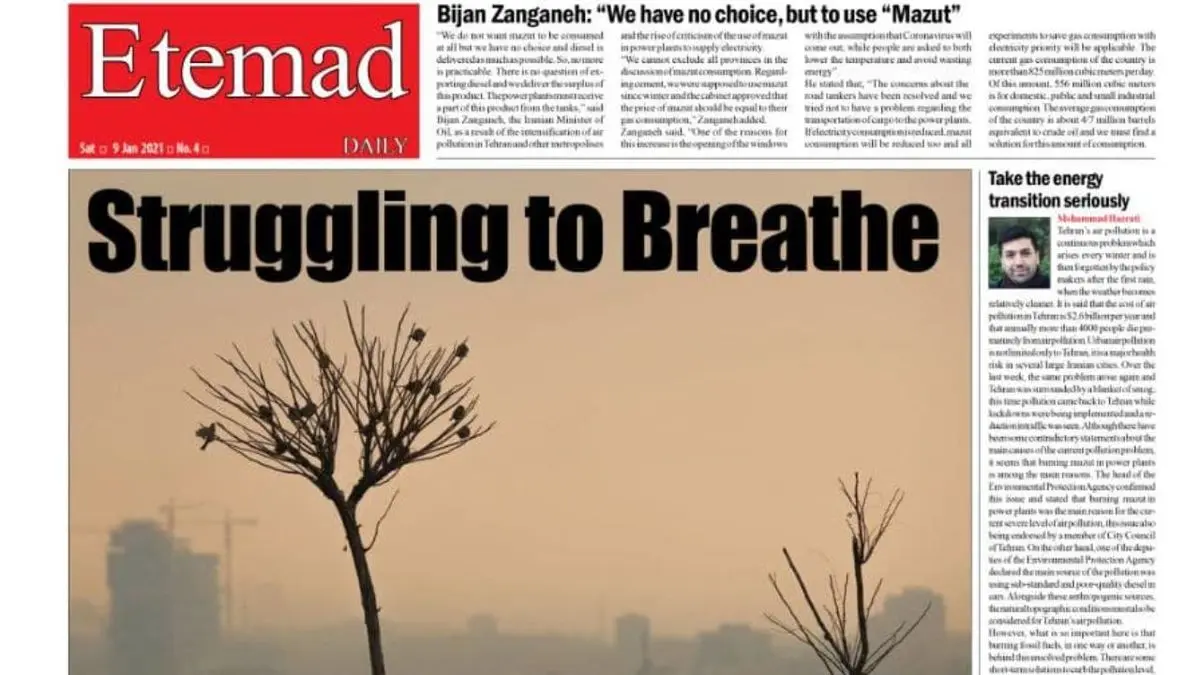
اعتمادآنلاین| صفحه انگلیسی روزنامه اعتماد برای آلودگی هوا در تهران با تیتر «تقلا برای نفس کشیدن» منتشر شد.

Bijan Zanganeh: "We have no choice, but to use "Mazut"
"We do not want mazut to be consumed at all but we have no choice and diesel is delivered as much as possible. So, no more is practicable. There is no question of exporting diesel and we deliver the surplus of this product. The power plants must receive a part of this product from the tanks," said Bijan Zanganeh, the Iranian Minister of Oil, as a result of the intensification of air pollution in Tehran and other metropolises and the rise of criticism of the use of mazut in power plants to supply electricity.
"We cannot exclude all provinces in the discussion of mazut consumption. Regarding cement, we were supposed to use mazut since winter and the cabinet approved that the price of mazut should be equal to their gas consumption," Zanganeh added.
Zanganeh said, "One of the reasons for this increase is the opening of the windows with the assumption that Coronavirus will come out, while people are asked to both lower the temperature and avoid wasting energy".
he stated that, "The concerns about the road tankers have been resolved and we tried not to have a problem regarding the transportation of cargo to the power plants. If electricity consumption is reduced, mazut consumption will be reduced too and all experiments to save gas consumption with electricity priority will be applicable. The current gas consumption of the country is more than 825 million cubic meters per day. Of this amount, 556 million cubic meters is for domestic, public and small industrial consumption. The average gas consumption of the country is about 4/7 million barrels equivalent to crude oil and we must find a solution for this amount of consumption.
Take the energy transition seriously
Mohammad Hazrati
Tehran's air pollution is a continuous problem which arises every winter and is then forgotten by the policy makers after the first rain, when the weather becomes relatively cleaner. It is said that the cost of air pollution in Tehran is $2.6 billion per year and that annually more than 4000 people die prematurely from air pollution. Urban air pollution is not limited only to Tehran, it is a major health risk in several large Iranian cities. Over the last week, the same problem arose again and Tehran was surrounded by a blanket of smog; this time pollution came back to Tehran while lockdowns were being implemented and a reduction in traffic was seen. Although there have been some contradictory statements about the main causes of the current pollution problem, it seems that burning mazut in power plants is among the main reasons. The head of the Environmental Protection Agency confirmed this issue and stated that burning mazut in power plants was the main reason for the current severe level of air pollution, this issue also being endorsed by a member of City Council of Tehran. On the other hand, one of the deputies of the Environmental Protection Agency declared the main source of the pollution was using sub-standard and poor-quality diesel in cars. Alongside these anthropogenic sources, the natural topographic conditions must also be considered for Tehran's air pollution.
However, what is so important here is that burning fossil fuels, in one way or another, is behind this unsolved problem. There are some short-term solutions to curb the pollution level, such as closing schools and universities on some days or imposing traffic restrictions, but while most of them have been applied they have not been successful and effective. There are also some long-term solutions which could effectively solve the problem and also have
significant contributions to tackle climate change. Energy transition is one of the most important of them. Energy transition is a pathway towards the transformation of the global energy sector from fossil-based to efficient, renewable and sustainable energy systems. Although at the heart of the energy transition is the need to reduce energy related CO2 emissions to limit climate change, it also has co-benefits for improving air quality.
Energy transition would create an opportunity for policy makers to act on climate change and air pollution together and take advantage of the synergies between the Paris Agreement climate goals and the UN's Sustainable Development Goals to improve lives now and limit future global warming. Renewable energy sources can contribute to improving air quality and human health, for instance by supplying electricity or heat without combustion fossil fuels.
Iran's geographic position is suitable for different forms of renewable energy. The southern provinces are suitable for solar and wind energy. Iran is located on the world's 'Solar Belt' experiencing high amounts of solar radiation with an average of 300 sunny days per year. It is stated that 1.7 million hectares of Iranian land receives more than 270 watts per square metre (W/m2) and 28 million hectares - which is equivalent to 17.5% of the country's total area - receives somewhere between 250 and 270 W/m2. In addition, Iran has the potential to produce 1.4 gigawatts (GW) of wind power and 2.1 million hectares of Iran's land has an average annual wind speed of 8 metres per second (m/s). Despite this huge potential to develop renewables, and the explicit declaration of the Sixth Five-Year National Development Plan (FYNDP) (1396-1400/2016-2021) to increase the share of renewable energy to at least 5% of overall power generation by 2021, their share of the country's total electricity generation capacity is still less than 1%. This is mainly because of the cheap resources of fossil fuels and the lack of infrastructure, investment and technology.
The country's huge reliance on the production and consumption of fossil fuels and its climate change and environmental implications necessitate an energy transition away from fossil fuels. Furthermore, an overreliance on only one or two sources of energy has made the country vulnerable to any variation in production, investment and export and the price of the resources has generally reduced its energy security. Several countries have introduced targets to achieve net-zero emissions by 2050 and the US will also probably join the Paris Agreement very soon to accelerate the pace of limiting global warming, all highlighting that the global demand of fossil fuel growth will also decline in the near future. Thus, now is the time for Iran to take the energy transition programme seriously, not only for the market's future but also for the environment and the health of its citizens.
Climate change and air pollution: two sides of the same coin
Reza Maddahi
The level of air pollution has again passed a critical level in Iًran. In many cities including Tehran, Isfahan, Mashhad, Tabriz and Qom, people are grappling with air pollution crises. Scientists believe that there is a clear synergistic interaction between air pollution and climate change. The key driver of climate change is the emission of carbon dioxide (CO2) while the main air pollutants are carbon monoxide (CO), lead (Pb), nitrogen dioxide (NO2), ozone (O3), sulphur dioxide (SO2) and particulate matter (PM). Both crises are a result of the same activity-the extensive use of fossil fuels. There are numerous scientific evidences demonstrating that the efforts to mitigate GHGs will reduce the consumption of fossil fuels and achieve significant reductions in other air pollutants that impact air quality. Air quality and climate policies can provide mutual benefits. This means by integrating climate and air pollution policies, policymakers can hit two birds with one stone.
The international framework made for strengthening efforts against climate change can be appropriately used in our country for both air pollution and climate change crises. The Paris Agreement is the main international legal instrument which aims at tackling climate change on a global scale. In December of 2015, at the United Nations Framework Convention on Climate Change's COP21 held in Paris, France, the world adopted the Paris Agreement, the successor to the Kyoto Protocol. It sets a new bottom-up approach with more flexible obligations and self-imposed mitigation and adaptation commitments for all countries. Under the Paris Agreement, member states, being those who ratified the Agreement, submit nationally determined contributions (NDCs) outlining plans to mitigate greenhouse gas emissions (GHGs). The success of the Paris Agreement is mainly dependent on implementing the NDCs which are simply the voluntary climate plans of countries based on their national interests, capabilities and circumstances. While the submission of NDCs is obligatory for member states, implementing them is not a legally binding obligation under the Agreement. Above all, there are numerous exclusive facilitative mechanisms for developing countries like that of Iran, such as TEC, CTCN, GEF and GCF, which provides member states with financial and technological support for their climate efforts.
In 2015, just before COP21 where the Paris Agreement was adopted, Iran's leadership issued a 15-point list of environmental policy directives which emphasized the importance of "Managing climatic changes and confronting environmental threats such as desertification, dust particles, drought and microbial and radioactive transmitters". The Paris Agreement was signed by the Rouhani administration in 2016. Like any other international treaty, the Agreement also requires the ratification of Parliament and the approval of the Guardian Council and is to be considered as a legally binding instrument under Iranian law. There is a huge misunderstanding amongst Iranian officials in Parliament and the Guardian Council about the legal and political consequences of ratifying the Agreement. Given the non-punitive and voluntary nature of most of the provisions under the Paris Agreement, by ratifying it the Islamic Republic of Iran, the world's seventh biggest emitter of CO2 in 2020, will be eligible to take advantage of the international financial and technological supports for tackling the air pollution and climate change crises. As of December 2020, there were just seven signatories that had not ratified the Paris Agreement: Eritrea, Iran, Iraq, Libya, South Sudan, Turkey and Yemen.
Whether mazut is consumed or not?
Whether mazut is consumed or not is a question that is now not so important for the people who are trapped under the heavy burden of air pollution on the one hand and the spread of Coronavirus on the other; what is important is for the people to eliminate or reduce the pollution.
What is being forgotten is the implementation of a law called the Clean Air Act; a law that requires 21 organizations to prioritize the country's air pollution situation. This law remains unimplemented until next year when the pollution starts again.
In response to Zahra Nejad Bahram, who is a member of the Tehran City Council, the Environment Organization denied the use of mazut in Tehran's power plants, announcing, "Do not deal politically with air pollution". Nejad Bahram emphasized that "the capacity of refineries is full of mazut and because of international sanctions no one buys it and we have to burn mazut in cities". Two weeks after the controversy over this claim, the head of the environmental organization officially mentioned the use of mazut in the country's power plants and acknowledged that this was undertaken by order of the Deputy Attorney General.
In his last interview with the Hamedli newspaper, Issa Kalantari mentioned, "The Deputy Attorney General has issued a circular to the provinces that you should not prevent fuel oil from being burned in power plants and industries. It means that someone who has to enforce the Clean Air Act, for security reasons, has concluded that this mazut should be burned".
There are fossil fuels, particularly in mazut and diesel. According to the head of the environmental organization, the country's refineries produce more than 25% of mazut with between 400,000 and 500,000 barrels of mazut being produced in the country per day and these fuel oils must either be exported or consumed. While it is not possible to export them due to sanctions, these fuel oils are used in heavy industries and lead to air pollution in metropolitan areas.
"We do not ignore people and their health due to economic constraints. I believe that the priority of the country is the health of the people. Otherwise, the Corona headquarters would not have been formed and no plans would have been made to protect the health of the people. People are complaining to us but we are also complaining about this air pollution situation," she said. This member of the City Council believes that despite the great pressures on the City Council to be responsible for the air pollution situation in Tehran, this council does not have sufficient legal authority in the matter. Although there is no objection to the installation of soot filters on buses in the Tehran City Council, Nejad Bahram believes that due to the lack of authority of the municipality, the municipality and the council can only make suggestions to solve this problem and have no executive power.
The effect of currency code extraction on electricity consumption and air pollution
The production of each bitcoin is equal to the annual electricity consumption of 24 households and consumes 35 million Tomans of electricity subsidised money.
The subsidy for each kW of electricity is 5,000 Rials, which means that the production of a bitcoin unit costs about 350 million Rials with government subsidies, or about $2,700, which if calculated at the global price of electricity would be more than $10,000. In other words, despite valuing $33,000, the production of each bitcoin unit imposes heavy side effects on the electricity network of Iran, the citizens' health and also the environment. It is, in fact, equal to the annual electricity consumption of 24 households in Iran.
In recent years, due to the low rate of electricity prices in Iran, the status of currency code extraction has become one of the country's critical problems and has increased electricity consumption in some parts of the country. Instead of being used in industrial production, some people have used various sheds and buildings that had three-phase electricity and industrial electricity in the field of currency code mining. By building devices and computers, and installing air conditioning fans and cooling devices, they have been trying to extract the currency code 24/7 and take advantage of the high price of bitcoin and other cryptocurrencies, the price of which has increased to $33,000 in recent days.
However, the issue is not limited to the use of industrial electricity but also the growth of electricity consumption in the industrial sector and high voltage and three-phase power plants. As it happens, home computers or computers at work are also extracting currency and electricity codes around the clock. Even in recent weeks, some
pyramid schemes have been formed and many people have announced during contact with friends and acquaintances that "you can use pyramid schemes to extract currency passwords without paying and only by consuming electricity and turning on computers and launching software".
The current method of extracting the currency code for bitcoin has caused a lot of temptation, which has resulted in increasing the country's elecricity consumption even in winter.
Therefore, one should note that those who extract currency codes for their own benefit, or have high electricity consumption, turn on unnecessary lights or use electric heating devices in this season, are actually increasing mazut consumption and air pollution for their compatriots, something which leads to headaches, shortness of breath and more health problems caused by air pollution.
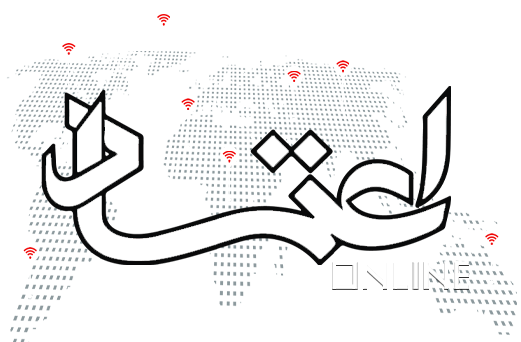

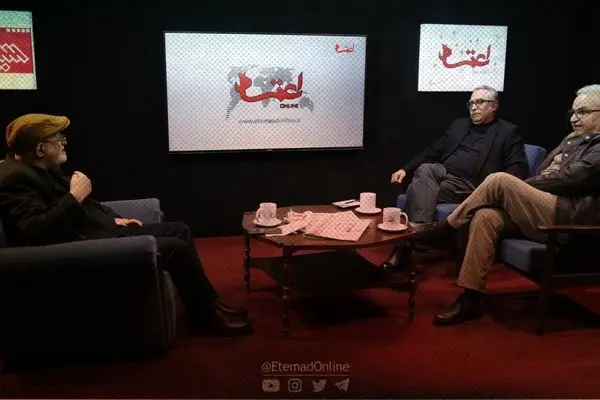
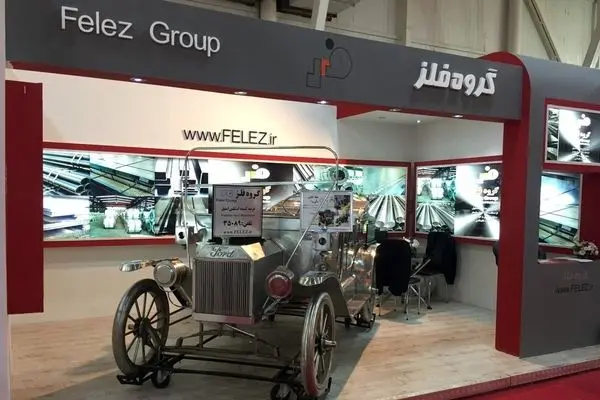
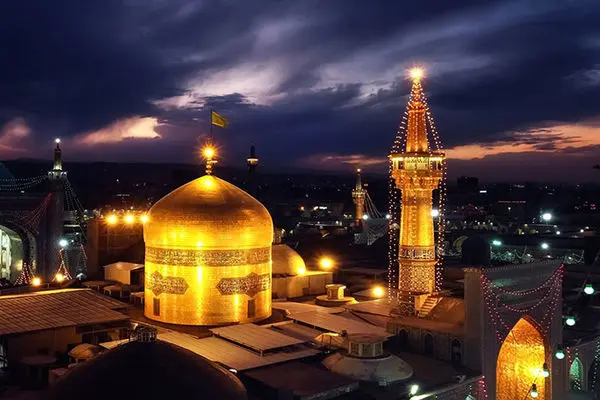

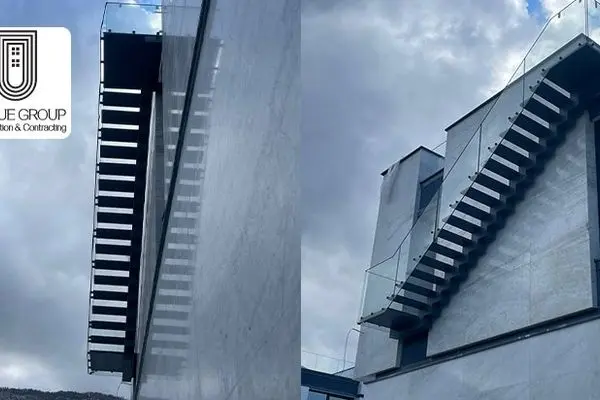

دیدگاه تان را بنویسید